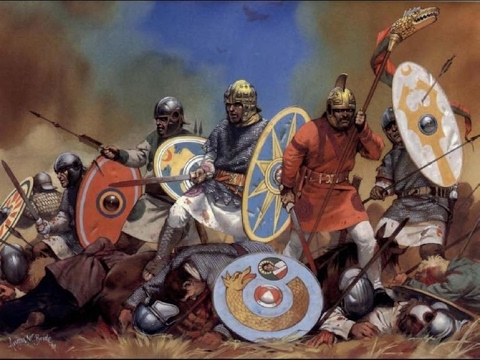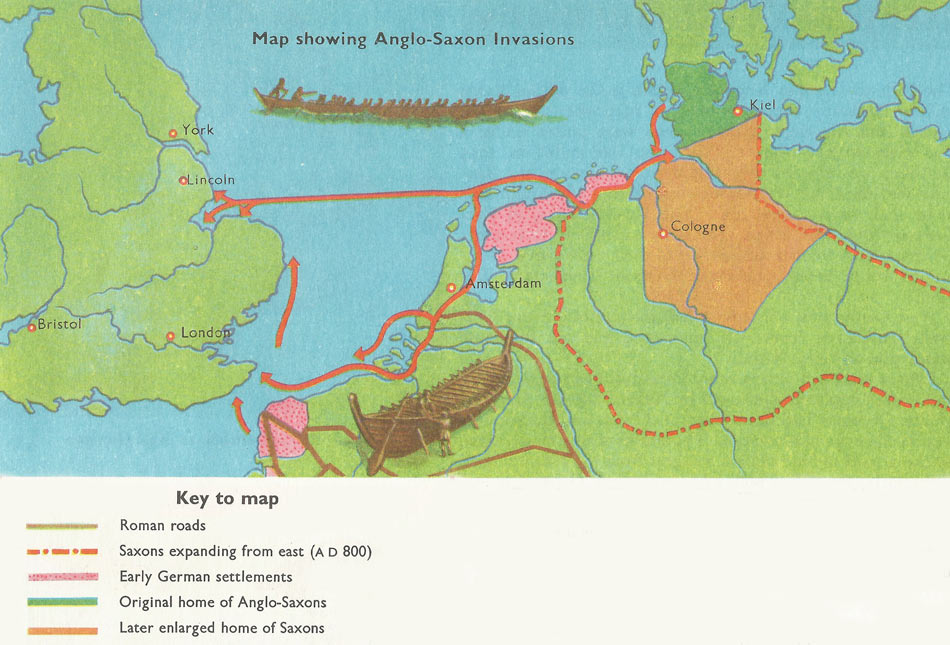
The historic timeline from 5th century to 11th century marked a relevance of the presence of Anglo Saxons in Britain, what is now known popularly known as ‘Anglo Saxons Britain’.
The invasion of the Anglo Saxons wasn’t successful at the first try as they were defeated by the already residing Romans. But when was the Anglo Saxons invasion finally happen?
It was actually in AD 449 that the invasion of the Anglo Saxons was successful. Many sources of information do claim that the actual year is AD 450. Being just a matter of one year, it still differs as the actual is the AD 449 and this is also considered as one of the myths of the invasion of Anglo Saxons on Britain.
The History of Anglo Saxons Invasion of Britain
Contents
As per the history of the Anglo Saxons invasion of Britain in 449, it was a very easy task for the Anglo Saxons to invade Britain. This is because, the second time when the Anglo Saxons returned, the Romans had already abandoned Britain. Not only abandoned, they didn’t even teach the Britishers on how to defend themselves on such invasion attacks.
However, the attack strategy of the Anglo Saxons was different and wise this time. Instead of attacking with all troops at one go, Anglo Saxons attacked different parts of Britain and these attacks were initiated under the command of different leaders.
This is how they made the invasion of Britain successful, not only because Britain didn’t have proper defence system but also due to the proper planning and attack strategy unlike the first time.
Now, Anglo Saxons is a collective term used to describe people of three tribes. These tribes are the Angles, the Saxons and the Jutes. After the Anglo Saxons invasion of Britain, these three tribes settled in different areas and thus even named the areas after them or changed the name of the citizens residing.
The Jutes decided that they would settle down in Kent. However, they chose to call themselves ‘Kentings’, that is, named after the place Kent.
The Angles decided that they would settle in East Anglia.
The Saxons decided to settle in four different areas. Those areas are Essex, Sussex, Middlesex and Wessex. These names were derived from East Saxons, South Saxons, Middle Saxons and West Saxons.
Anglo Saxons Invasion of England Map

If one views the Anglo Saxons invasion map which contains the invasion path of the Anglo Saxons, it will be a lot easier to understand. The Anglo Saxons journey of invasion started from Denmark, Germany and Netherlands. They made the use of wooden boats in order to sail through the North Sea from these three countries to reach Britain. Their wooden boats used to be long in nature, and consisted of only one sail but many numbers of ores.
How did the Norman Invasion affect Anglo Saxons English?
The Normans invaded Britain, defeated the Anglo Saxons and had control over Britain in the 11th century, exactly on 1066. Since then, the English language followed by the Anglo Saxons was massively affected. The way the Norman moulded the English language and incorporated the presence of new words, it resulted in a massive effect of the inflections that was caused by the English language followed by the Anglo Saxons (which is old English).
Apart from only the English language, it also changed many of the German words. Thus, it is actually true that English was massively changed by the Normans.
But, would it come to effect if the people didn’t accept it?
The reason that the language actually changed over the course of time implies or proves that one or few people started accepting the change and then brought others to accept the change.
Thus, a chain like structure was formed which started influencing people and then the percentage started growing. As a result of this, more people started inducing the change of language in them. This also naturally changed the spoken language.
Anglo Saxons Invasion Facts
Following mentioned are some of the facts in regards to the Anglo Saxons and to relation with the Anglo Saxons invasion of England.
- Anglo Saxons being the natives of Germany, Denmark and Netherlands, they were actually immigrants.
- At a particular conference, the Anglo Saxons chose to murder their own hosts in order to gain power and dominance over Britain.
- The attacks of the Anglo Saxons during invasion of England was held under the leadership of different leaders but this entire rally or show was run by one mysterious master head.
- Anglo Saxons emerged a total of seven kingdoms under them after the successful invasion over Britain. They are namely, Northumbria, Essex, Kent, Mercia, East Anglia, Sussex and Wessex.
- Due to the competition between these seven kingdoms as to who will gain the maximum dominance over the others, it was finally the King of Mercia who evolved as the sole winner and ruled from 626 AD to 655 AD.
- It is believed that after the Roman pope, Gregory successfully converted people into Christians, he rejuvenated the English church. Well, it was actually a refugee from Africa who had the main helping hand in reforming the church of England.
Anglo Saxons Invasion Myth
There is a big belief many people hold that the Anglo Saxons invasion over Britain was a myth. Various explanations have been given regarding the same where people debate to justify their point as to why they call it a myth.
Again, there is a group of people who debate on the opposite path. To understand whether the invasion by the Anglo Saxons is a reality or just a myth, it is better that one understands himself after going through various historical evidences and existing documents. The reason being said this is, nothing can be a myth if there is proper historical evidence.
It is not advisable to only base the knowledge over the internet but to actually witness, if at all there are any facts. The British museum is a good place for such proofs as they have a wide section of the Anglo Saxons.